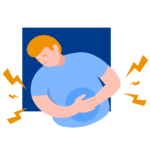Dizziness is a feeling of being lightheaded, faint or unsteady. It can affect your balance, vision and hearing. Dizziness can have various causes and effects on your health and well-being. In this blog post, we will discuss the causes, symptoms and treatment of dizziness, as well as some tips on how to prevent and cope with it.
What causes dizziness?
Dizziness can be caused by different factors, such as:
• Inner ear problems: Your inner ear contains fluid and structures that help you sense your position and movement. If your inner ear is inflamed, infected or damaged, it can send false signals to your brain and cause dizziness. Some common inner ear problems that can cause dizziness are:
• Benign paroxysmal positional vertigo (BPPV): This is when tiny crystals in your inner ear become dislodged and move around in the fluid. This can trigger brief episodes of spinning sensation when you move your head in certain ways.
• Labyrinthitis: This is when your inner ear becomes inflamed due to a viral or bacterial infection. This can cause dizziness, nausea, vomiting and hearing loss.
• Meniere’s disease: This is when your inner ear has abnormal fluid pressure and volume. This can cause episodes of dizziness, ringing in the ears, hearing loss and a feeling of fullness in the ear.
• Low blood pressure: Your blood pressure is the force of your blood pushing against your blood vessels. If your blood pressure drops too low, it can reduce the blood flow to your brain and cause dizziness. The following are some of the most prevalent reasons of low blood pressure:
• Dehydration: develops if you lose more fluids than you intake. This can happen due to excessive sweating, vomiting, diarrhea or fever.
• Medications: Some medications can lower your blood pressure as a side effect or interact with other drugs. These include diuretics, antihypertensives, antidepressants, antipsychotics, nitrates and alcohol.
• Medical conditions: Some medical conditions can affect your blood pressure regulation and cause dizziness. These include heart problems, anemia, diabetes, thyroid problems and adrenal insufficiency.
• Low blood sugar: Your blood sugar is the amount of glucose in your blood. Your cells’ primary source of energy is glucose. If your blood sugar drops too low, it can affect your brain function and cause dizziness. The following are some of the most prevalent reasons of low blood sugar:
• Skipping meals or fasting: This can deprive your body of glucose and cause hypoglycemia.
• Excessive exercise: This can use up your glucose reserves and lower your blood sugar levels.
• Medications: Some medications can lower your blood sugar as a side effect or interact with other drugs. These include insulin, sulfonylureas, metformin, beta-blockers and alcohol.
• Medical conditions: Some medical conditions can affect your blood sugar regulation and cause dizziness. These include diabetes, pancreatitis, liver disease and hormonal imbalances.
• Anxiety and stress: Anxiety and stress are emotional states that can affect your physical and mental health. If you experience anxiety or stress, you may have symptoms such as:
• Rapid heartbeat
• Shallow breathing
• Sweating
• Trembling
• Nausea
These symptoms can also affect your blood pressure, blood sugar and inner ear function and cause dizziness.
What are the symptoms of dizziness?
The main symptom of dizziness is having a feeling of being lightheaded, faint or unsteady. Other signs that you may encounter include:
• Spinning sensation or vertigo
• Loss of balance or coordination
• Blurred vision or double vision
• Ringing in the ears or hearing loss
• Nausea or vomiting
• Headache or migraine
• Confusion or disorientation
How is dizziness diagnosed?
Dizziness is usually diagnosed based on your medical history, physical examination and tests. Your healthcare provider may ask you about your symptoms, when they started, how they affect you, what triggers them and what relieves them. They may also ask you about your diet, medications, allergies, medical conditions and family history. They may also perform some tests to rule out any underlying causes of dizziness. These tests may include:
• Blood tests: These are carried out to look for symptoms of infection. anemia, diabetes, thyroid problems, or hormonal imbalances.
• Urine tests: To check for signs of dehydration, diabetes or kidney problems.
• Ear tests: To check for signs of inner ear problems such as BPPV, labyrinthitis or Meniere’s disease. These tests may involve moving your head in different positions, applying air or water pressure to your ears, or measuring your eye movements.
• Balance tests: To check for signs of balance problems such as vestibular neuritis, acoustic neuroma or stroke. These tests may involve standing on a platform, walking on a treadmill, or wearing goggles that stimulate your vision.
• Imaging tests: To check for signs of brain problems such as tumor, infection or bleeding. These tests may involve taking pictures of your brain using X-rays, CT scans or MRI scans.
How is dizziness treated?
The treatment of dizziness depends on the cause and severity of your condition and your personal preferences. The main goals of treatment are to relieve your symptoms, treat the underlying cause and prevent complications. Some of the common treatments for dizziness are:
• Medications: Some medications can help you with dizziness by reducing inflammation, controlling nausea, lowering blood pressure or stabilizing blood sugar. However, these medications are not suitable for everyone and may have side effects such as drowsiness, dry mouth, headache or constipation. You should only use these medications under the supervision of your healthcare provider and in combination with other treatments. Some examples of medications for dizziness are:
• Antihistamines: These are used to treat inner ear problems such as BPPV, labyrinthitis or Meniere’s disease. They function by inhibiting the effects of histamine. a chemical that causes inflammation and swelling in the inner ear. Some examples are meclizine, dimenhydrinate and cinnarizine.
• Antiemetics: These are used to treat nausea and vomiting caused by dizziness. They work by blocking the signals from the brain that trigger vomiting. Some examples are metoclopramide, ondansetron and promethazine.
• Antihypertensives: These are used to treat high blood pressure that may cause dizziness. They work by relaxing the blood vessels and reducing the force of the blood flow. Some examples are beta blockers, calcium channel blockers and angiotensin-converting enzyme inhibitors.
• Hypoglycemics: These are used to treat low blood sugar that may cause dizziness. They work by increasing the glucose levels in the blood. Some examples are glucose tablets, glucagon injections and insulin injections.
• Vestibular rehabilitation: This is a type of physical therapy that helps you improve your balance and coordination by retraining your brain and inner ear to work together. It involves doing exercises that stimulate your vestibular system, such as head movements, eye movements and body movements. You may do these exercises at home or with a therapist.
• Canalith repositioning maneuvers: These are techniques that help you treat BPPV by moving the crystals in your inner ear to a less sensitive area. They involve moving your head in specific patterns while lying down or sitting up. You may do these maneuvers at home or with a therapist.
• Surgery: This is an option for some cases of dizziness that do not respond to other treatments or have serious complications such as hearing loss or brain damage. Surgery may involve removing part of the inner ear, severing the nerve connecting the inner ear to the brain or inserting a device that stimulates the nerve.
How can dizziness be prevented?
Some tips to prevent dizziness include:
• Eating a balanced diet that meets your energy and nutrient needs.
• Avoiding skipping meals or fasting as this can lead to low blood sugar.
• Drinking plenty of water and avoiding dehydration.
• Limiting alcohol intake as this can affect your blood pressure and inner ear function.
• Quitting smoking as this can damage your blood vessels and reduce oxygen supply to your brain.
• Using relaxation techniques such as meditation to manage stress yoga or breathing exercises.
• Getting adequate sleep and maintaining a consistent sleep routine.
• Avoiding sudden changes in position or movement that may trigger dizziness.
ConclusionDizziness is a feeling being lightheaded faint unsteady Dizziness can have various causes effects health well-being Dizziness can be caused by inner ear problems low blood pressure low blood sugar anxiety stress Dizziness can cause feeling unsteady spinning sensation loss balance blurred vision ringing ears nausea vomiting headache confusion Dizziness can be diagnosed by medical history physical examination tests Dizziness can be treated by medications vestibular rehabilitation canalith repositioning maneuvers surgery The main goals treatment relieve symptoms treat underlying cause prevent complications Dizziness can be prevented by eating balanced diet avoiding meal skipping Limiting alcohol consumption by drinking water smoking cessation coping with stress, getting enough sleep, and avoiding abrupt changes position change.



